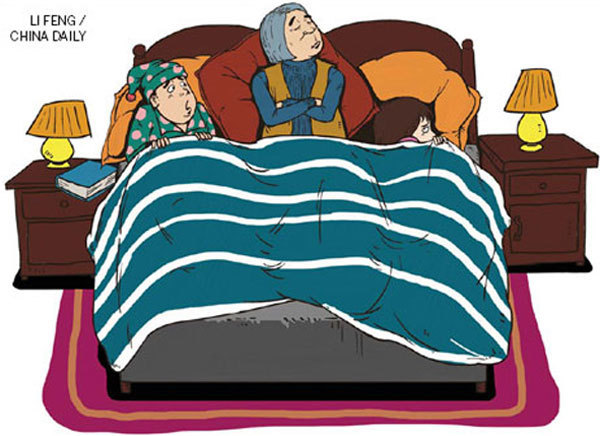Society
Maintaining the balance
Updated: 2011-04-22 10:21
By Zhou Wenting (China Daily European Weekly)

Good in-law relationships are the key to marital success
Yi Jun had a bitter quarrel with her mother-in-law. The harsh words extinguished the joy of her pregnancy.
"She said she doesn't want her grandchild to have single-edged eyelids like me. None of my elders has humiliated me so severely since childhood," says Yi, a 27-year-old Beijing native. She is one of the post-1980 generation, the first ones born under the country's family planning policy.
In-law relationships have become trickier in China as the spoiled kings and queens have stepped into marriage. The young women's inability to take care of themselves and their swelling individualism challenge a mothers-in-law's endurance, while the latter's concentrated care for the only son hurts the daughters-in-law.
According to divorce lawyers, the in-law relationship has become a major reason for the high divorce rate of the post-1980 generation. Last year, 1.96 million couples applied for divorce, and China's divorce rate has risen an average 7.6 percent a year since 2003, figures released by the Ministry of Civil Affairs show.
More understanding, space and wisdom should be added in the relationship to help ease the tension, experts in family affairs say.
Traditionally, after a woman married, she became part of the husband's family and lived with them. Men did not leave their parents' home, so a bride lived with her parents-in-law and even grandparents-in-law.
"Chinese women used to have a strong sense of 'double parents'. Before marriage, a bride's mother would tell the daughter to treat the parents-in-law even better than her own parents," Gu Xiuqin, secretary-general of the China Association of Social Workers' marriage and family affairs committee.
But the traditional practice does not seem to work today. First, the only child has been accustomed to receiving care and service rather than to giving.
Seven years ago, before Zhou Yanli's marriage, her mother told her mother-in-law, "My only daughter grew up in a honeypot. She doesn't do housework. Please excuse her."
As expected, Zhou, a 30-year-old Shanghai native, never once dropped her fingers to a rag and mopped. Two weeks ago, when her mother-in-law went to a neighboring province to sweep tombs for three days, Zhou did not even know how to brush her 3-year-old daughter's teeth or do up her pigtails or to make her own bed.
"I don't care that my daughter-in-law doesn't do chores, but I can't help getting mad at her slovenly habits, which undermine the fruit of my labor ceaselessly," says Zhou's 55-year-old mother-in-law, surnamed Xu.
Whenever Xu yammered that no one was like Zhou when they were daughters-in-law, a conflict was inescapable.
What they were taught
If the habits of the spoiled set relationships to simmering, their swelling individualism pours oil on the flames.
Three months ago, Song Yun and her mother-in-law ended in a deadlock when discussing the name of Song's newborn boy. Song did not like the name her mother-in-law chose, but she won the fight by writing the name she preferred on the birth certificate during hospital discharge procedures.
"I admit it is difficult for me to compromise, for nobody has ever controlled my decisions," says Song, 25, who works for a Shanghai headhunter agency. "Sometimes even if I nod in the face of my mother-in-law, I won't actually carry it out."
Experts in family affairs say the young generation should not suffer all the blame, for they were educated only to achieve success, not to give care and manage relationships.
"The only-child generation is exempted from all the housework by parents so that they can grab every minute to study and stand out in the fierce competition for schools and jobs," Gu, of the social workers group, says. "It is understandable that they are weak in living habits and handling relationships."
Tension is also caused by the disappearance of traditional norms of a woman's submission and virtue, which suppressed the conflict of in-law relationships, says Yi Shenghua, a lawyer at Beijing Yingke Law Firm. "The education that women receive today endows them with more individuality than ever."
That does not mean they can always be mommy's girls, and keep being as self-willed as they were with their own parents.
"They have to change their mentality and adjust their positions in the new family," says Xia Xueluan, a sociology professor at Peking University. "Although young women are no longer at the beck and call of parents-in-law, they have to acknowledge the seniors' authority and at least take action to show respect."
Pamper the only son
It is widely acknowledged that the man, who is in the middle of his mother and wife, is the main issue of the relationship.
In the past, a mother-in-law's love and attention were dispersed when she had several children. Now the only son, who has been the sole receiver of his mother's care, stresses the in-law relationship.
Su Chengfeng, 60, a mother-in-law in Jingzhou, Hubei province, says that the first time she met her son's girlfriend, three years ago, she was overwhelmed by the feeling that her son was snatched away. Her rage increased as she saw her son carry each dish to the girl's plate, peel shrimp for her, talk to her laughingly.
"I felt like I was invisible," Su says. "It's not my son's mistake to treat his girlfriend well, but I was really sad that my boy, who in my eyes was still the little infant sleeping next to me, now takes care of another woman."
After her son married, Su's war with her daughter-in-law escalated frequently.
"I suffered a bitter in-law relationship when I was a daughter-in-law, so I originally thought I must be a kind mother-in-law. But I can't control myself," Su says.
The daughter-in-law was dissatisfied that Su asked her to share housework while Su's son was exempted, although they were both busy with their jobs. Su asked the daughter-in-law to shop for groceries on a Sunday morning, but when she wanted to wake her husband to accompany her, Su told her to let the man sleep more.
"I spent all my effort to cultivate my only son to amount to something, so I don't want him to bear any hardship," Su says. "For the same reason, anything that happened to my son made me nervous."
At the end of that year, after an altercation between her son and daughter-in-law, Su went to a temple to draw divination sticks, which told her the daughter-in-law would bring misfortune to her son. Su didn't dare not to believe. She began to find faults with her daughter-in-law, and finally triggered a fierce argument.
The marriage ended within one year.
Distance can help
To dodge everyday in-law clashes, it is increasingly popular for the post-1980 generation to live independently after marriage. Experts in family affairs welcome the practice, saying it is the most effective way to keep a harmonious relationship.
"We can give a long list of theoretical methods to deal with in-law conflicts, but they often fail in real life," says Xu Liugen, director of the China Association of Social Workers' marriage and family affairs committee. "It is the right time for the young generation to break away with the tradition of sharing a house with parents."
Apartments for sale appeared in China after reform and opening-up was introduced in 1978. Past generations, except some whose employers provided housing, did not have alternatives other than living with parents. Young couples today have the option.
According to the 2010 Report of Young Chinese Internet Users' Attitudes Toward Love and Marriage, up to 80 percent of people aged 18 to 35 live or plan to live apart from parents after marrying. The report was conducted by a research center established in 2005 by Peking University and Baidu, the search engine company.
However, most young adults can only gaze at housing prices and sigh.
"Who doesn't want a home of her own and to escape the mother-in-law's nagging? But we can never afford a house with a modest salary," says Zhou, the Shanghai native. "Compared with the in-law conflict, the housing price is a fiercer tiger."
Cut them some slack
A house alone does not solve the problem. Family affairs experts say both sides of the in-law relationship should be lenient with each other, because they grew up in disparate environments and were educated differently.
Hu Yue, a 24-year-old Shanghai native, has a closet overflowing with handbags. When she heard her mother-in-law complain of her wastefulness, she did not get angry. She stopped buying handbags and clothes so frequently.
"It is normal that two generations don't share the same consumption concept, for they lived a hard life when they were young," says Hu, whose compromise quite pleased her mother-in-law.
Some post-1980 women, who also got along well with their mothers-in-law, say the secret is to solve disputes with knowledge - or to prevent themselves by keeping some information private.
Sun Xiaowen, 27, who works for a magazine in Shanghai, says: "No matter how soiled, lazy and peevish I am with my husband, I don't reveal that in front of my mother-in-law."
Specials

Sino-US Dialogue
China and the US hold the third round of the Strategic and Economic Dialogue from May 9-10 in Washington.

V-Day parade
A military parade marking the 66th anniversary of the Soviet victory over Nazi.

Revolutionary marriage
A newlywed couple sings revolutionary songs during their marriage.